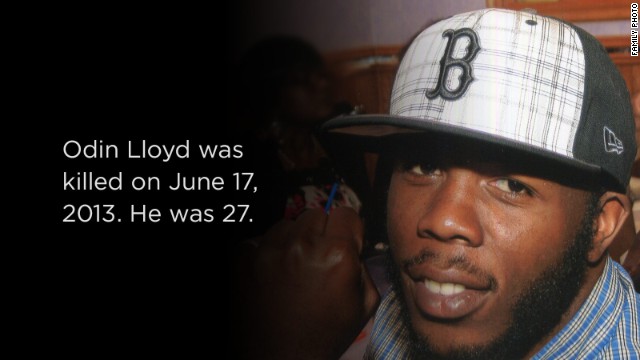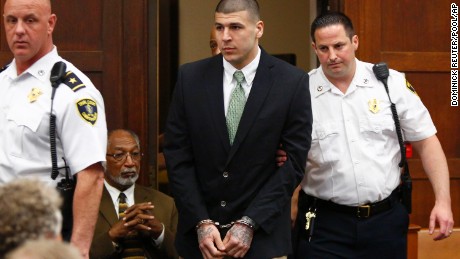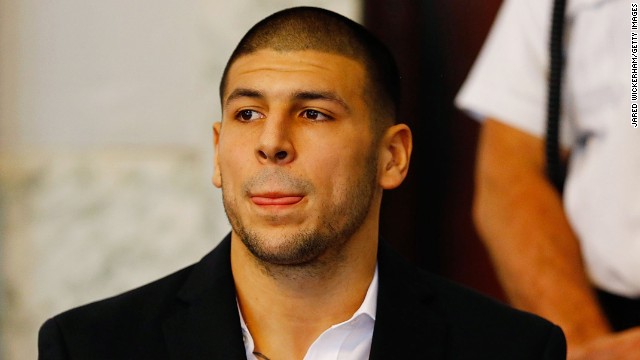You are using an out of date browser. It may not display this or other websites correctly.
You should upgrade or use an alternative browser.
You should upgrade or use an alternative browser.
So, The Aaron Hernandez trial started today.....
- Thread starter MikeB
- Start date
He did it. Stop wasting taxpayer's money. Break his ribs and either kill him or fly him 50 miles across the border from about 4 stories high and throw him out of the plane
I disagree. A patriot fan told me that he saw Joe Montana in the area and Chris Mortonsen was driving the getaway car. The bullet that killed that kid could not have come from Hernandez gun...the atomospheric pressure actually inflates his bullets and they can't fit in the weapon. He is being framed by a former jets vice president of personell.
FREE AARON!!
"He said a marijuana joint found near Lloyd's body had Hernandez's and Lloyd's DNA. Hernandez's DNA also was on a shell casing from a bullet found under the driver's seat of the rental car, Bomberg said. He told jurors that the casing was fired by the same weapon as casings found at the crime scene: a .45-caliber Glock."
Really? This guy is dumb enough to leave bullets in the rental car. But yet smart enough to make the weapon disappear for good? Seems fishy to me.
Really? This guy is dumb enough to leave bullets in the rental car. But yet smart enough to make the weapon disappear for good? Seems fishy to me.
I disagree. A patriot fan told me that he saw Joe Montana in the area and Chris Mortonsen was driving the getaway car. The bullet that killed that kid could not have come from Hernandez gun...the atomospheric pressure actually inflates his bullets and they can't fit in the weapon. He is being framed by a former jets vice president of personell.
FREE AARON!!
Not going to find one pats fan defending this scum.
"He said a marijuana joint found near Lloyd's body had Hernandez's and Lloyd's DNA. Hernandez's DNA also was on a shell casing from a bullet found under the driver's seat of the rental car, Bomberg said. He told jurors that the casing was fired by the same weapon as casings found at the crime scene: a .45-caliber Glock."
Really? This guy is dumb enough to leave bullets in the rental car. But yet smart enough to make the weapon disappear for good? Seems fishy to me.
He did a lot of dumb things but at the very least he was smart enough to get rid of the murder weapon.
I remember the Mass State Police were asking the public at the time to look for a passenger side mirror from a certain make and model vehicle. I thought at the time they were asking the public to help look for the gun without saying "hey, help us look for the gun"
<cite class="el-editorial-source">(CNN)</cite>To watch or not to watch. That is the question for 12 jurors and six alternates in the Massachusetts murder trial of former New England Patriots player Aaron Hernandez when the region's beloved Patriots play in Super Bowl XLIX on Sunday.
On a day in which the girlfriend of victim Odin Lloyd took the stand and Lloyd's mother again left the courtroom in tears, Bristol County Superior Court Judge Susan Garsh on Friday had a warning for the jury.
"I am not going to forbid you from watching the Super Bowl if that's something that's really important to you," she said.
But the judge closed the second day of testimony by advising jurors to be vigilant for mention of Hernandez, who helped lead the Patriots to Super Bowl XLVI nearly three years ago.
"You hear that word, you've got to walk out of the room," Garsh said. "Distance yourself."
Hernandez will not be watching his former team. He's incarcerated in a high security unit where prisoners are forbidden from watching TV.
Hernandez, 25, pleaded not guilty in the 2013 killing of Lloyd, 27, who dated the sister of Hernandez's fiancée.
Two alleged accomplices, Ernest Wallace and Carlos Ortiz, have pleaded not guilty and will be tried separately.
As she did one day earlier, Lloyd's mother, Ursula Ward, walked out of the courtroom sobbing as prosecutors showed the jury graphic photos of her son's body.
Lloyd, who was shot six times, was shown lying on his back in the industrial park where his body was found.
Later Friday, Shaneah Jenkins, 23, who was dating Lloyd at the time of his death, took the witness stand. Her sister, Shayanna, is Hernandez's fiancee and mother of his child.

Remembering Odin Lloyd 5 photos
EXPAND GALLERY
Shaneah Jenkins testified that she introduced Lloyd to Hernandez on her birthday in August 2012.
Jenkins told the jury that Lloyd and Hernandez were in the "beginning stages of a friendship."
She said the two men and others would gather in Hernandez's basement "man cave" -- with fitness and theater rooms, a bar and pool table emblazoned with the Patriots' logo -- to smoke marijuana.
But Jenkins said she was not aware of her boyfriend and Hernandez hanging out except for the day Lloyd was killed.
In opening statements Thursday, defense lawyer Michael Fee said the two men were close friends and that Hernandez had no reason to kill Lloyd.
[h=3]Evidence destroyed[/h]Fee described the victim as one of his client's "partying pals" who was known as the "blunt master'' for the marijuana cigars he often procured for Hernandez. The two men could have been brothers-in-law, he said.
"Aaron Hernandez is not the murderer of his friend," Fee said. "In June 2013, Aaron Hernandez was planning his future, not a murder."
The case has divided the Jenkins sisters, who sit on opposite sides of the courtroom -- Shaneah with Lloyd's mother and Shayanna with Hernandez's family. Shayanna was not in court Friday.
Other witnesses Friday described how Lloyd's body was found near Hernandez's house. One man said he saw the victim on his back, stiff and motionless, with "flies flying in and out of his nose."
In the front row, Lloyd's mother wept.

Photos: Rise and fall of Aaron Hernandez 13 photos
EXPAND GALLERY
On Thursday, prosecutor Patrick Bomberg said Hernandez not only orchestrated, but also participated in and covered up the killing.
Bomberg summed up the prosecution's largely circumstantial case, telling the jury that Hernandez and his associates killed Lloyd and then "took evidence with them and tried to and, in some cases were successful, in destroying evidence."
The three picked up Lloyd and drove to a secluded area where he was shot and killed, Bomberg said.
A marijuana blunt found near Lloyd's body had traces of both his DNA and that of Hernandez, Bomberg said. Hernandez's DNA also was found on a .45-caliber shell casing found in a car he had rented.
A footprint at the industrial park where Lloyd's body was found matched sneakers worn by Hernandez, the prosecutor said.
[h=3]'Never had a chance'[/h]Though the motive for the killing is unclear, Bomberg said Lloyd and Hernandez were at a nightclub days before and the defendant appeared annoyed. Hernandez was angry when he left the club.
The defense said the one-time NFL star worth $40 million was targeted by police and prosecutors in the death of the semipro football player because of celebrity status.
Hernandez "never had a chance" as authorities zeroed in, Fee told the jury.
Fee sought to plant doubt in the jury, saying police went after Hernandez from the start.
"As soon as they found out Aaron Hernandez -- a celebrity football player for the New England Patriots -- was a friend of Odin Lloyd's, it was over," he said.
The prosecution will try to "dazzle and distract you" with the fruits of an investigation that was "sloppy and unprofessional," Fee said.
The case against his client is "just a story and it's not true," he added.
The prosecutors will argue that Lloyd's killing was a "joint venture." Under Massachusetts state law, prosecutors don't necessarily have to prove who pulled the trigger. Under joint venture, anyone who actively participates in a killing can be found guilty, according to legal experts.
On June 16, 2013, Lloyd was riding with friends in a black Chevrolet Suburban, which police later learned was rented by Hernandez.
Close friend Daryl Hodge was with Lloyd when he said Lloyd got a text from Hernandez, asking to hang out later that night.

Former NFL player charged with murder 02:51
PLAY VIDEO
As they parted ways, Lloyd told Hodge he'd see him later.
Lloyd's body was found the next day.
The judge has blocked any mention that Hernandez was indicted in connection with two other killings in Boston. Hernandez pleaded not guilty in the shooting deaths of Ernesto Abreu and Safiro Furtado outside a bar in Boston in 2012. A trial date hasn't been set.
On a day in which the girlfriend of victim Odin Lloyd took the stand and Lloyd's mother again left the courtroom in tears, Bristol County Superior Court Judge Susan Garsh on Friday had a warning for the jury.
"I am not going to forbid you from watching the Super Bowl if that's something that's really important to you," she said.
But the judge closed the second day of testimony by advising jurors to be vigilant for mention of Hernandez, who helped lead the Patriots to Super Bowl XLVI nearly three years ago.
"You hear that word, you've got to walk out of the room," Garsh said. "Distance yourself."
Hernandez will not be watching his former team. He's incarcerated in a high security unit where prisoners are forbidden from watching TV.
Hernandez, 25, pleaded not guilty in the 2013 killing of Lloyd, 27, who dated the sister of Hernandez's fiancée.
Two alleged accomplices, Ernest Wallace and Carlos Ortiz, have pleaded not guilty and will be tried separately.
As she did one day earlier, Lloyd's mother, Ursula Ward, walked out of the courtroom sobbing as prosecutors showed the jury graphic photos of her son's body.
Lloyd, who was shot six times, was shown lying on his back in the industrial park where his body was found.
Later Friday, Shaneah Jenkins, 23, who was dating Lloyd at the time of his death, took the witness stand. Her sister, Shayanna, is Hernandez's fiancee and mother of his child.

Remembering Odin Lloyd 5 photos
EXPAND GALLERY
Shaneah Jenkins testified that she introduced Lloyd to Hernandez on her birthday in August 2012.
Jenkins told the jury that Lloyd and Hernandez were in the "beginning stages of a friendship."
She said the two men and others would gather in Hernandez's basement "man cave" -- with fitness and theater rooms, a bar and pool table emblazoned with the Patriots' logo -- to smoke marijuana.
But Jenkins said she was not aware of her boyfriend and Hernandez hanging out except for the day Lloyd was killed.
In opening statements Thursday, defense lawyer Michael Fee said the two men were close friends and that Hernandez had no reason to kill Lloyd.
[h=3]Evidence destroyed[/h]Fee described the victim as one of his client's "partying pals" who was known as the "blunt master'' for the marijuana cigars he often procured for Hernandez. The two men could have been brothers-in-law, he said.
"Aaron Hernandez is not the murderer of his friend," Fee said. "In June 2013, Aaron Hernandez was planning his future, not a murder."
The case has divided the Jenkins sisters, who sit on opposite sides of the courtroom -- Shaneah with Lloyd's mother and Shayanna with Hernandez's family. Shayanna was not in court Friday.
Other witnesses Friday described how Lloyd's body was found near Hernandez's house. One man said he saw the victim on his back, stiff and motionless, with "flies flying in and out of his nose."
In the front row, Lloyd's mother wept.

Photos: Rise and fall of Aaron Hernandez 13 photos
EXPAND GALLERY
On Thursday, prosecutor Patrick Bomberg said Hernandez not only orchestrated, but also participated in and covered up the killing.
Bomberg summed up the prosecution's largely circumstantial case, telling the jury that Hernandez and his associates killed Lloyd and then "took evidence with them and tried to and, in some cases were successful, in destroying evidence."
The three picked up Lloyd and drove to a secluded area where he was shot and killed, Bomberg said.
A marijuana blunt found near Lloyd's body had traces of both his DNA and that of Hernandez, Bomberg said. Hernandez's DNA also was found on a .45-caliber shell casing found in a car he had rented.
A footprint at the industrial park where Lloyd's body was found matched sneakers worn by Hernandez, the prosecutor said.
[h=3]'Never had a chance'[/h]Though the motive for the killing is unclear, Bomberg said Lloyd and Hernandez were at a nightclub days before and the defendant appeared annoyed. Hernandez was angry when he left the club.
The defense said the one-time NFL star worth $40 million was targeted by police and prosecutors in the death of the semipro football player because of celebrity status.
Hernandez "never had a chance" as authorities zeroed in, Fee told the jury.
Fee sought to plant doubt in the jury, saying police went after Hernandez from the start.
"As soon as they found out Aaron Hernandez -- a celebrity football player for the New England Patriots -- was a friend of Odin Lloyd's, it was over," he said.
The prosecution will try to "dazzle and distract you" with the fruits of an investigation that was "sloppy and unprofessional," Fee said.
The case against his client is "just a story and it's not true," he added.
The prosecutors will argue that Lloyd's killing was a "joint venture." Under Massachusetts state law, prosecutors don't necessarily have to prove who pulled the trigger. Under joint venture, anyone who actively participates in a killing can be found guilty, according to legal experts.
On June 16, 2013, Lloyd was riding with friends in a black Chevrolet Suburban, which police later learned was rented by Hernandez.
Close friend Daryl Hodge was with Lloyd when he said Lloyd got a text from Hernandez, asking to hang out later that night.

- [h=3][/h]
Former NFL player charged with murder 02:51
PLAY VIDEO
As they parted ways, Lloyd told Hodge he'd see him later.
Lloyd's body was found the next day.
The judge has blocked any mention that Hernandez was indicted in connection with two other killings in Boston. Hernandez pleaded not guilty in the shooting deaths of Ernesto Abreu and Safiro Furtado outside a bar in Boston in 2012. A trial date hasn't been set.
Judge says he can watch the game Sunday, but if they start saying his name... he needs to walk away from the TV .... LOL
Thought that part was pretty funny
Haha.....that was the Judges directions to the jury when he dismissed them early today.....Aaron can't go to far away from the TV I'm sure.







